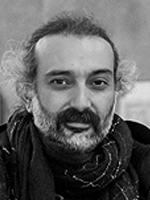Dr. Ahmet Kerim Gültekin

Areas of Interest
- Kurdish Alevism studies (especially Dersim studies)
- oral history and folk beliefs (especially sacred place cults within Dersim Alevism)
- anthropology of religion
- ethnography (methodological approaches on oral history and collective memory)
Transformation of Religious Authority among Alevi Kurds of Germany. The Ocak System in-between Political and Religious Agendas
Alevis are one of the significant ethno-religious communities historically diffused to a wide geography from the Balkans to the Middle East. Due to mainly economic, but also political reasons, a significant part of the Alevi population has since the mid-20th century emigrated to Europe. Although the community is quite heterogeneous, they have a common problem, namely to maintain their religious identity in complex socio-cultural and economic circumstances in Europe. Alevi Kurds, the focus of this project, occupy a significant place among Alevi communities of Germany due to the specifics of their particular belief system and their involvement in oppositional socio-religious and political activities. This project will examine the strategies that Alevi Kurds in the German diaspora develop to maintain their sacred lineage (ocak) system. As a self-enclosed ethno-religious group, Alevi Kurds traditionally maintained their traditions throughout generations based on oral transmission of their beliefs and practices, embodied in the social and religious authority of these hereditary lineages. Even though important academic work has been done on Alevi Kurds (and on other Alevi groups) residing in Europe, especially in Germany (Sökefeld 2015; Zırh 2008; Langer 2015), the impact of the central ocak system in the context of the transformation of Alevism in the diaspora has not yet been analysed in detail (for explorations in this direction see Dressler 2006; Tee 2010). Much academic work on Alevism in Europe has focused on social transformation and the process of political recognition (for example Massicard 2013). The role of the ocak system, constitutional for Alevism as a social and religious tradition, is still under-researched. In order to have a better grasp of how Alevi-Kurdish communities living in diasporic contexts maintain their tradition, ethnographical analysis of the “ocak” system as a living institution is important. This will allow us to get a better picture of how Alevi Kurds maintain their tradition in negotiation with new socio-political environments.
Biography
Visiting Scholar (Philipp Schwartz Fellow), KFG “Multiple Secularities”, Leipzig University (Germany)
Assistant Professor and Lecturer (M.A. and B.A.), Munzur University (Turkey)
Visiting Lecturer (B.A.), Tunceli University (Turkey)
PhD Ethnology, Ankara University (Turkey)
Relevant Publications
- Gültekin, Ahmet Kerim (forthcoming). “Thinking of Alevis as ‘Majority’: Alevi and Sunni Communities of Dersim,” in Identity Revisited - Cultural, Religious, Social and Political Perspectives.
- Gültekin, Ahmet Kerim (forthcoming).“Şavak Tribe – An Example in the Context of Diversity of Cultural Identities,” in Aspects of “Dersim” Historical and Contemporary Works on Alevi Kurds.
- Gültekin, Ahmet Kerim (2016). “Cemevi mi Ziyaret (Jiar) mi? Dersim’de Mekânın “Kutsal” Halleri,” Journal of Alevi Studies 11: 45–72.
- Gültekin, Ahmet Kerim (2016). “Counter-Publics and Local Practices: The Struggle for Revolutionary Local Government,” in The Road to Gezi – Resistance and Counter-Publics in 21st Century Turkey. Edited by Gamze Yücesan-Özdemir, S. 175–91. Ottawa: Red Quill Books.
- Gültekin, Ahmet Kerim (2016).“Kürt Dağlarından Bir Baraj Öyküsü: Pervari HES”, in Sudan Sebepler – Türkiye’de Neo-Liberal Su-Enerji Politikaları ve Direnişler, Edited by Aksu, Cemil; Erensü, Sinan; Evren, Erdem S. 223–47, Istanbul: İletişim Yayınları.
- Gültekin, Ahmet Kerim (2016).“Çoğunluğun Azınlığında Bir Antropoloğun Yabancılık Deneyimleri” (Experiences of Strangeness of an Anthropologist in a Community of Minority), in Etnografik Hikâyeler – Türkiye’de Alan Araştırması, Edited by Harmanşah, Rabia; Nahya, Z. Nilüfer, S.118–37, Istanbul: Metis Yayınları.
- Gültekin, Ahmet Kerim (2015).“Tarihselci ve Yorumsamacı Yaklaşım Işığında “Sultan/Üryan Hıdır/Hızır” Söylencesi Üzerine Düşünceler,” Social Sciences Journal of Tunceli University, 4/7: 7–20.
- Gültekin, Ahmet Kerim (2015). “Marksizm ve Antropoloji: Eleştirileri ve Güncel Bağlamı Yeniden Düşünmek,” Social Sciences Journal of Tunceli University, 1/6: 36–53.
- Gültekin, Ahmet Kerim (2015). “Cumhuriyetin Kuruluş Dönemi Açısından Antropoloji ve Irkçılık Tartışmaları Hakkında Görüşler,” Ankara University Journal of Languages and History-Geography 55/1: 1-111.
- Gültekin, Ahmet Kerim (2013). “Safii Kürt Topluluklarda Kutsal Mekân İnanmalarına Dair Güncel Bir Bakış: Beğendik/Bêdar Örneği (Siirt - Pervari),” Ankara University Journal of Languages and History-Geography 53/1: 267–303.
- Gültekin, Ahmet Kerim (2013). “Kültürel Kimliklerin Çeşitliliği Bağlamında Özgün Bir Örnek: Şavak Aşireti,” Ankara University Journal of Languages and History-Geography 26: 129–56.
- Gültekin, Ahmet Kerim (2013). “Kürt Topluluklarda Aşiret Tipi Toplumsal Örgütlenme Yapılarında Değişme Dinamiklerine Güncel Bir Bakış: Beğendik-Bedar Örneği (Siirt-Pervari),” Praksis 29: 87–107.
- Gültekin, A. K. and Özbudun, S. (2012). Kültür-Kimlik Politikaları Atölyesi (A Workshop on Politics of Culture and Identity), in Devrimci Halkçı Yerel Yönetimler Atölye Sonuç Metinleri pp: 94 – 108, Ankara: TMMOB.
- Gültekin, Ahmet Kerim (2010). Tunceli’de Sünni Olmak – Tunceli Pertek’te Ulusal ve Yerel Kimlik Öğelerinin Etnolojik Tetkiki (Being Sunni in Tunceli - An Ethnological Investigation of National and Local Identity Constituents of Sunni Minority in Tunceli/Pertek). Istanbul: Berfin Yayınları.
- Gültekin, Ahmet Kerim (2004). Tunceli’de Kutsal Mekân Kültü (The Cult of Holy-Sites in Tunceli). Ankara: Kalan Yayınları.


